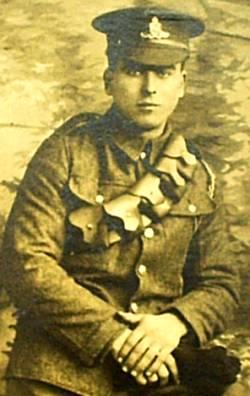Ernest Appleford
Driver Ernest Appleford, Royal Field Artillery
 Ernest Appleford. |
Ernest, born in 1893, was the son of Henry Appleford and his wife, Sarah Ann (née Alexander), who were employed on Lower Farm in Winterbourne. Henry worked with the farm horses, describing himself as head groom in 1901 and carter in 1911.
By 1911 young Ernest, aged 18 was also working as a farm labourer. When war came in 1914 enormous numbers of young men rushed to sign up. Ernest was not amongst this group. This was a difficult time for the Applefords, Ernest's mother, Sarah, had died in June 1914 aged 53, then his father, Henry, died in early 1915. His elder brothers Alfred and Frank had signed up and Alfred was killed in April 1916.
The introduction of conscription by the Military Service Act, 1916, meant that Ernest could no longer avoid joining up. However, appeals could be made against conscription through a series of tribunals having local, county and national jurisdiction.
Initially Ernest was 'starred' in recognition that he was in a job that was important to the war effort. His employer Mr George Baylis was desperate to keep men on the farm, having lost several who volunteered. He made a deal with the authorities to let another man (Charles Hamblin) go if he could keep Ernest. Such deals often existed only in the minds of the employers and prospective soldiers - the 'authorities' would deal with cases individually on their merits. The Military were keen to get every fit young man into uniform and would appeal against a lad like Ernest being starred - they would argue that the starring may mean that the job was important, but that it could be be done by someone else, a woman perhaps, or an older man, or, increasingly, by former soldiers no longer fit for service.
In May 1916 the local tribunal for Newbury Rural District ruled that Ernest should be unstarred but gave him exemption from call-up until 30 September (to allow Baylis to get the harvest in find a substitute).
The army was still coming to terms with the training of hundreds of thousands of conscripts; in 1914 the problem was solved by the creation of hundreds of new battalions to take the enthusiastic volunteers. In 1916 the need was different, trained replacements for existing battalions. However, conscription meant they could control the intake calling up men as training places came available. This probably explains why Ernest was not called up until January 1917, when he was sent off for training with the Royal Field Artillery. It is likely that he was posted to the RFA barracks at Bordon, south east of Alton in Hampshire.
A few weeks after his arrival Ernest was hospitalised at the military hospital in Cosham, north of Portsmouth, where he died of cerebro spinal fever (spinal meningitis) on 17 February 1917. His brother, Frank, was to survive the war.
The local response to Ernest's death is recorded in the local paper:
Newbury Weekly News, 1 March 1917 p3
Winterbourne.
Pte Ernest Appleford. – The news of the death of Pte Ernest Appleford came as a particularly sad and pathetic circumstance to all the people living in this little village, he having joined the colours only five weeks ago, the last of that noble band who had gone out from here at the call of King and Country. He was in the Royal Field Artillery, and died in the Alexandra Hospital, Cosham, on February 17th. The body was conveyed to Newbury by late train on Tuesday and brought over to Winterbourne on Wednesday and laid to rest in the new ground at Winterbourne Churchyard. At the funeral, at which the Rev B H B Atlee, Vicar of Chieveley, officiated, nearly every household in the village were represented, together with Mr Alfred Baylis, his late employer. The hymn sung in the church was “O God our help in ages past,� and as the body was borne to the grave on the shoulders of eight comrades of the RFA, the “Dead March in Saul� was played. Floral tributes of affection placed on the coffin, were from Florrie, Laura, Frank, Edith, Lizzie and other members of the family and friends. The death of Ernest is further saddened by the thought that his brother Alfred, was killed in action only ten months ago, and both parents have died within three years. The remaining brother is now on active service somewhere in France.
The names of most of the men who died in the service of their country in the Great War are remembered by the Commonwealth War Grave Commission (CWGC) in their roll of honour and on gravestones and monuments all over the world. Ernest's name was, for many years, one that was overlooked. This has been partially remedied and his name was added to the roll of honour in September 2011 thanks to the efforts of the In from the Cold project. However, his grave is still not recognised, no stone marks the spot where this young man lies, indeed the precise location of his grave cannot be determined. Hopefully the CWGC will be able to erect a stone parking his presence 'Somewhere in this churchyard'.
Both Alfred and Ernest are commemorated on the Winterbourne War Memorial.

Find a memorial :
| Died this day: | |
| 03 February 1917 | |
| Edward George Savage | |
| Newbury |

Like this site? Show your appreciation through a donation to a great charity.